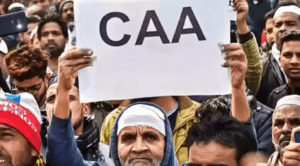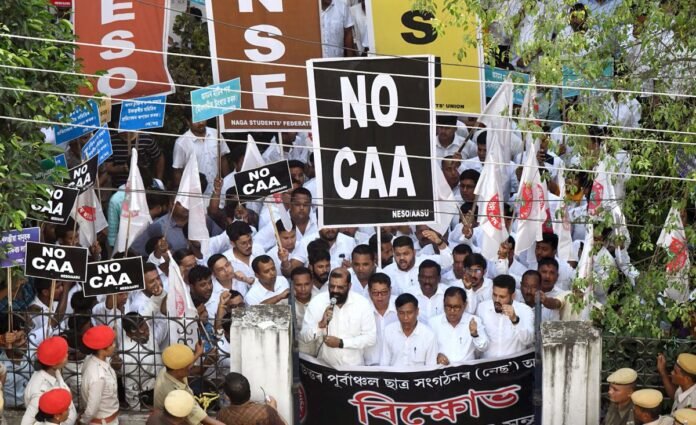2024 Lok Sabha Elections Government Expected to Announce CAA Rules Ahead of Model Code of Conduct, Sources Suggest.
3 min read 2024-02-28, 11:50 PM IST
Summary⇒ Government’s Intentions: Government sources indicate that the Ministry of Home Affairs is considering notifying the rules for the Citizenship Amendment Act (CAA) before the implementation of the model code of conduct, which typically precedes Lok Sabha elections. ⇒ Long-standing Delay: Despite the bill’s passage in 2019 and subsequent presidential ratification, the rules for the CAA have not been notified for nearly five years. This delay has raised concerns and prompted inquiries into the government’s intentions. ⇒ Drafting of Rules: The Ministry of Home Affairs has reportedly drafted the rules and is currently reviewing them at the highest levels of government. Once finalized, the rules will be published on the ministry’s website, signaling the implementation of the CAA. ⇒ Impact on Persecuted Minorities: The CAA provides a pathway to Indian citizenship for persecuted minorities from Pakistan, Afghanistan, and Bangladesh, including Hindus, Buddhists, Jains, Sikhs, Christians, and Parsis. Once the rules are notified, these individuals can apply for citizenship under the amended act. ⇒ Political Ramifications: The implementation of the CAA holds significant political implications, especially in states like West Bengal and Assam. While West Bengal’s Chief Minister Mamata Banerjee has vehemently opposed the act, Assam’s Chief Minister Himanta Biswa Sarma’s stance is crucial due to the state’s demographics and historical issues with illegal immigration from Bangladesh. ⇒ BJP’s Strategy: The BJP sees the implementation of the CAA as an opportunity to strengthen its electoral prospects, particularly in West Bengal. The party aims to leverage the act to appeal to key voter demographics and improve its performance in the upcoming Lok Sabha elections. ⇒ Controversies and Opposition: The CAA has been a subject of controversy since its introduction, with critics arguing that it discriminates against Muslims and undermines India’s secular principles. The implementation of the act is likely to face opposition from various quarters, raising questions about inclusivity and the rights of marginalized communities. ⇒ Ongoing Debate: As the government moves forward with its plans to notify the rules for the CAA, the political landscape is expected to witness heightened activity and debate surrounding this contentious issue. The coming months will be crucial in determining the implications of the act on India’s social fabric and political dynamics. |
In relation to the Citizenship Amendment Act, there are indications from government sources that the Ministry of Home Affairs could be moving forward with notifying the rules before the implementation of the model code of conduct. The model code of conduct typically comes into effect once the dates for the Lok Sabha elections are announced. It is anticipated that these dates will be revealed sometime within the next fortnight, possibly within the next week to ten days. Consequently, there is a possibility that the government could announce the rules for the Citizenship Amendment Act during this period.
The Home Ministry has been seeking extensions since the bill’s passage in 2019 and subsequent ratification by the President. However, for nearly five years, the rules have yet to be notified. This delay has been a matter of concern. The Ministry has reportedly drafted the rules, and they are currently under review at the highest levels. It appears to be only a matter of time before the Ministry of Home Affairs publishes the notification on its website, signaling the implementation of the Citizenship Amendment Act as passed by both houses of Parliament. (also read: Amit Shah: CAA to be Enforced Prior to 2024 Lok Sabha Polls).
What is Citizenship Amendment Act
The Citizenship Amendment Act (CAA) is a legislation passed by the Parliament of India in December 2019. It provides a pathway to Indian citizenship for certain religious minorities from neighboring countries. The key provisions of the CAA are as follows:
- Eligible Communities: The CAA applies to six religious communities – Hindus, Sikhs, Buddhists, Jains, Parsis, and Christians – who faced religious persecution in Pakistan, Bangladesh, and Afghanistan.
- Cut-off Date: The act specifies that only those individuals belonging to the aforementioned communities who entered India on or before December 31, 2014, will be eligible for citizenship.
- Exclusion of Muslims: Critics argue that one of the most controversial aspects of the CAA is that it excludes Muslims from its purview. This exclusion has led to accusations of discrimination and a violation of India’s secular principles.
- Fast-track Citizenship: Under the CAA, eligible individuals from the specified communities can apply for citizenship through a simplified and expedited process, bypassing the usual lengthy naturalization procedures.
- Rationale: Proponents of the CAA argue that it is a humanitarian gesture aimed at providing refuge to persecuted minorities from neighboring countries. They contend that these communities face systematic discrimination and persecution on religious grounds in their home countries and deserve protection.
- Controversy: The Citizenship Amendment Act has sparked widespread protests and controversy across India. Critics view the act as discriminatory, arguing that it undermines India’s secular fabric by explicitly excluding Muslims. They also raise concerns about its potential impact on India’s social cohesion and constitutional values.
- Legal Challenges: The CAA has faced multiple legal challenges in various courts across India. Critics have questioned its constitutionality, particularly its compatibility with the fundamental right to equality enshrined in the Indian Constitution.
The Citizenship Amendment Act is a piece of legislation that seeks to provide expedited citizenship to certain religious minorities from neighboring countries. However, it has been highly contentious, sparking debates about secularism, inclusivity, and the protection of minority rights in India.

Once these rules are notified, individuals belonging to persecuted minorities from Pakistan, Afghanistan, and Bangladesh—specifically Hindus, Buddhists, Jains, Sikhs, Christians, and Parsis—will be able to apply for Indian citizenship under the amended act. This development holds significant implications, particularly for states like Bengal and Assam. Both states have been at the center of the debate surrounding the Citizenship Amendment Act.
In West Bengal, Chief Minister Mamata Banerjee has vocally opposed the Citizenship Amendment Act, vowing not to allow its implementation in the state. Similarly, in Assam, Chief Minister Himanta Biswa Sarma’s stance on the issue has been crucial. The Citizenship Amendment Act could significantly impact the political landscape in these states, making it a matter of considerable importance for both regional and national political parties.
The BJP, in particular, is keen on leveraging the Citizenship Amendment Act to strengthen its position in West Bengal. With the upcoming Lok Sabha elections on the horizon, the timing of the notification of rules for the act becomes all the more critical. Shantanu Thakur, the BJP minister from West Bengal, has previously indicated the party’s intention to implement the act in the state. While the timeline for implementation may have shifted, there is a concerted effort within the government to push forward with the notification of rules.
The draft rules have already been prepared and are undergoing scrutiny at the highest political levels. Political considerations are paramount in this process, especially concerning states like Assam and West Bengal. In Assam, the issue of illegal immigration from Bangladesh has long been a contentious one, and the Citizenship Amendment Act could potentially exacerbate existing tensions.
Furthermore, the Matua community in West Bengal represents a significant vote bank, making the implementation of the act a politically sensitive issue in the state. The BJP sees an opportunity to make gains in both Assam and West Bengal through the Citizenship Amendment Act, particularly in light of the upcoming elections.
However, while the BJP may be hopeful of capitalizing on the act politically, its implementation could also stir controversy and opposition from various quarters. The Citizenship Amendment Act has been a subject of heated debate since its introduction, with critics arguing that it discriminates against Muslims and undermines the secular fabric of India’s constitution.
Nevertheless, with the government signaling its intent to move forward with the notification of rules, the political landscape in states like West Bengal and Assam is likely to undergo significant shifts in the coming months. The BJP’s stance on the Citizenship Amendment Act will be closely watched, as it seeks to make inroads in states where its electoral fortunes have historically been less favorable.
The notification of rules for the Citizenship Amendment Act holds far-reaching implications for both the political landscape and social fabric of India. While it may provide a pathway to citizenship for persecuted minorities, it also raises questions about inclusivity, secularism, and the rights of marginalized communities. As the government moves forward with its plans, the coming months are sure to be marked by heightened political activity and debate surrounding this contentious issue.

